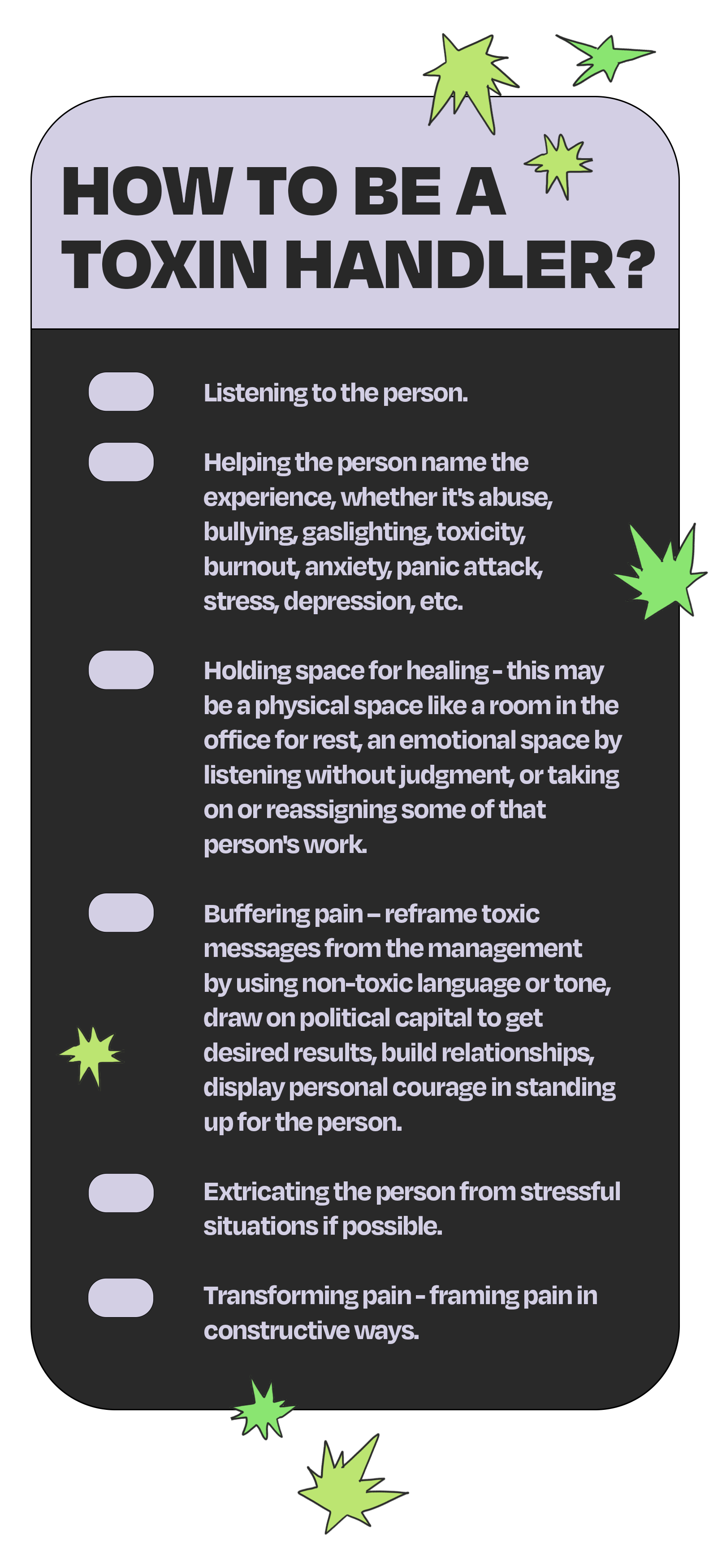As Christians colleagues or managers, we can “Bear one another’s burdens” at work (Galatians 6:2).
In this next section*, I suggest some practical ways we can do this for colleagues who are enduring injustice at work.
Again, I share from the book Toxic Emotions at Work: How Compassionate Managers Handle Pain and Conflict by Peter J Frost, who suggests that colleagues or managers at work can help journey with people in toxic workplaces by being “toxin handlers”.
Toxin handlers can do so by:

In my previous organisation, a senior Christian lawyer took up the role of an ombudsman. An ombudsman is a person appointed by an organisation to look into complaints.
He was a great guy, always warm and very humble even though he’s very successful — I remember how he would change into a T-shirt to help stack chairs at events.
As an ombudsman, he would constantly let everyone — especially junior staff — know and feel that if they have any issues, they could speak with him.
He would listen to them, try to explain management’s position, and try to advocate for them with upper management.
On hindsight, I realise he was playing the role of a toxin handler.
If we caused hardship
What if we are the person who caused hardship on a colleague?
I had originally planned to share some biblical principles I discovered about being a godly leader. However, I have been advised it would be too much.
So, if you’re interested, you can read more in this piece I wrote here.
Instead, I want to address two main points: self-awareness and seeking reconciliation.
First, we may not even realise that we have treated our colleagues wrongly. Management research shows that the greatest problem of poor leaders is a lack of self-awareness. It’s not just leaders, but many of us who lack self-awareness.
As Christians, we are exhorted in the Scriptures to develop self-awareness to grow in spiritual maturity. Psalm 139:23-24 says:
“Search me, O God, and know my heart!
Try me and know my thoughts!
And see if there be any grievous way in me,
and lead me in the way everlasting!”
Our colleagues, and especially subordinates, may feel afraid to speak truthfully to us about how they feel.
Hence, it’s important to explicitly invite colleagues to share their honest feedback about us.
This is both a verbal and non-verbal invitation. We need to develop a culture of safety and honesty for people to be honest.
So, if colleagues give us feedback, we should actively listen without judgment.
We do not have to respond immediately. Appreciate the person’s feedback. Carefully consider the feedback before responding.
If we are quick to respond without careful consideration, it will come across as dismissive. The person will hear the message that you don’t really want to listen; you just want to dismiss or defend.

Second, if we realise we may have wittingly or unwittingly treated a colleague unfairly or unkindly, we should seek forgiveness and reconciliation.
I believe that’s a fundamentally Christian virtue and a demonstration of the Gospel.
Jesus said in Matthew 5:22-24: “whoever insults his brother will be liable to the council … So if you are offering your gift at the altar and there remember that your brother has something against you, leave your gift there before the altar and go. First be reconciled to your brother, and then come and offer your gift.”
In Kara Martin’s book, Workship: How To Use Your Work To Worship God, she recounts an anecdote of a Christian nurse: The nurse has just gone through a long and sad day because a patient wasn’t responding well to treatment.
Weary and stressed, she noticed one of the cleaners did not do a good job. She rudely scolded the cleaner as she left the room.
That evening she was convicted about her conduct. She rushed to work early the next morning to apologise to the cleaner.
If we realise we may have wittingly or unwittingly treated a colleague unfairly or unkindly, we should seek forgiveness and reconciliation.
The cleaner burst into tears and explained that she had often been yelled at but this was the first time anyone had apologised to her.
The nurse shared that she was a Christian and felt convicted to seek her forgiveness.
That started many conversations thereafter on sin, grace, forgiveness and the Christian faith.
In conclusion, we learn from 1 Peter 2 that it is a calling to endure suffering in the manner of Christ and being mindful of God to grow in knowing Him and to witness for Him.
Yet, in today’s context of employment, we have the option to resign or transfer, speak to our bosses or colleagues or to seek recourse where appropriate.
Whatever the case, we should share our burden with someone, seek counsel and pray.
As Christians in the workplace, we can learn to bear one another’s burdens by being toxin handlers.
Even when we fall short, we should seek forgiveness and reconciliation. And may it be that God will use us, even our failings, to work for good.
Finally, we should seek greater self-awareness about how we treat others.
I pray for us that whatever circumstances we are in at work, we will become more like Christ and know more of Christ — His suffering and also His resurrection life!
* This is the third article in a three-part message from Ronald JJ Wong on suffering injustice in the workplace. Here’s where you can find part one and part two.
- Who is a good example of a toxin handler you’ve come across?
- What are some specific things he or she did that you might want to emulate when you handle toxicity in the workplace?
- Who might you be a “toxic handler” to?
- Pray for strength, grace and wisdom to be a blessing in your workplace in this way.










